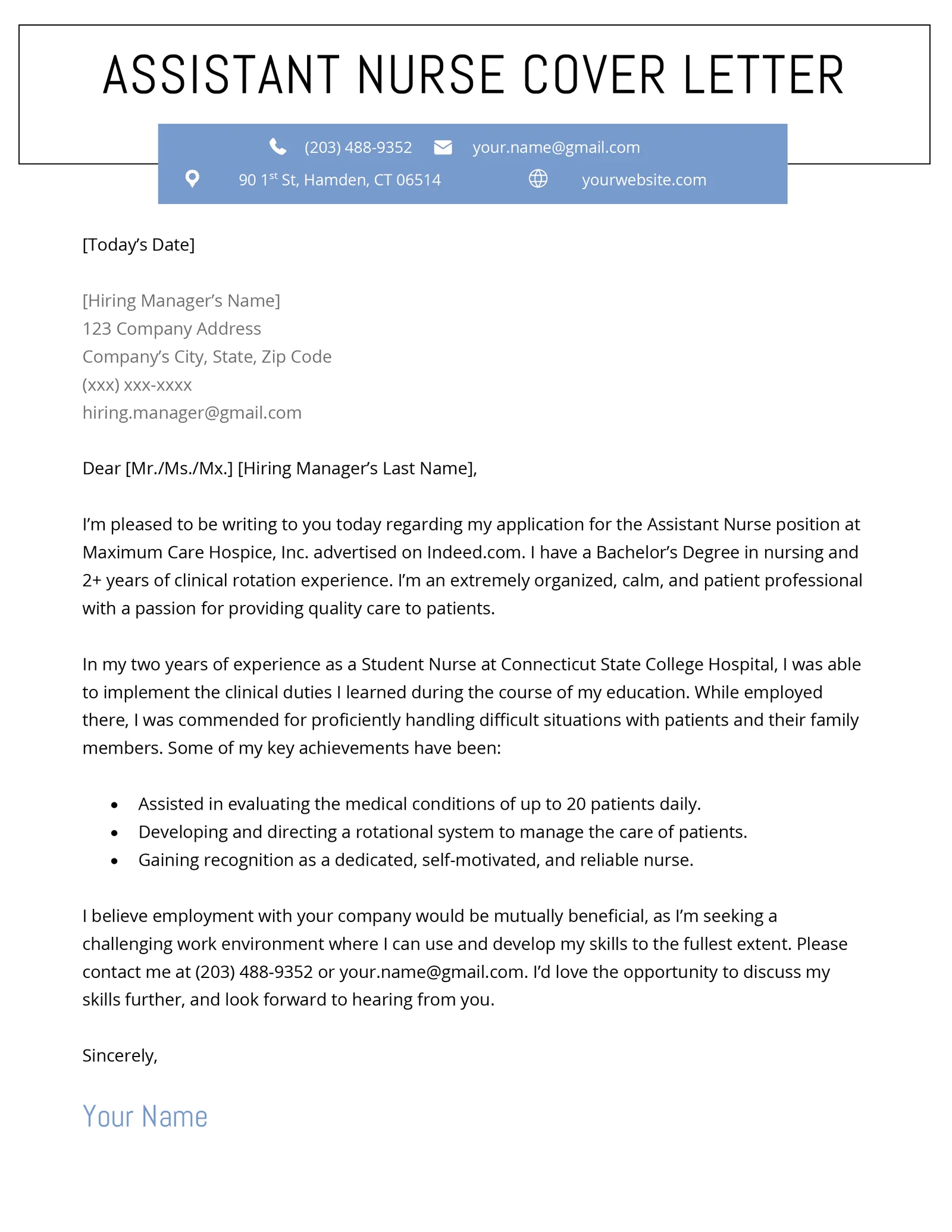Crafting Your RN Cover Letter
As a new graduate Registered Nurse (RN), your cover letter is your first opportunity to make a strong impression on potential employers. It’s your chance to introduce yourself, highlight your skills and experience, and demonstrate your enthusiasm for the nursing profession. A well-crafted cover letter can significantly increase your chances of landing an interview and ultimately, your dream job. This guide provides essential tips and strategies to help you create a compelling RN cover letter that gets you noticed and helps you get hired fast. The cover letter acts as your personal introduction, allowing you to showcase your unique qualifications and express your passion for nursing. It’s a critical document that complements your resume and gives the hiring manager a more comprehensive understanding of you as a candidate.
Understanding the Importance of a Cover Letter
A cover letter is more than just a formality; it’s a crucial tool in your job application arsenal. It provides context to your resume, allowing you to elaborate on your qualifications and express your personality and enthusiasm for nursing. While your resume lists your skills and experiences, your cover letter allows you to explain why you’re the ideal candidate for a specific role and organization. It’s an opportunity to demonstrate your communication skills, attention to detail, and genuine interest in the position. In a competitive job market, a well-written cover letter can set you apart from other applicants and increase your chances of getting an interview.
Why a Cover Letter Matters for New Grads
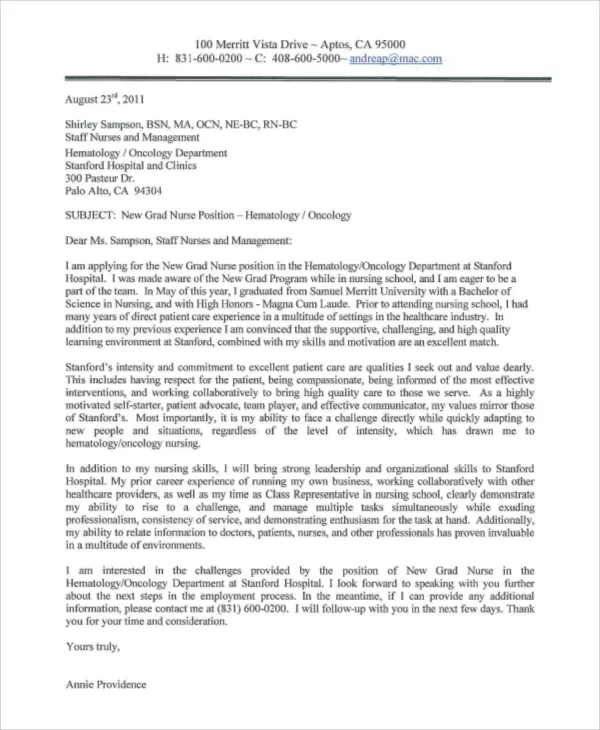
For new graduate RNs, a cover letter is particularly important because it offers a platform to address your lack of extensive work experience. It allows you to highlight your academic achievements, clinical rotations, and any relevant skills and experiences gained during your nursing education. Your cover letter can showcase your passion for nursing, your eagerness to learn, and your commitment to providing excellent patient care. It can also be used to explain any gaps in your resume or to address specific requirements of the job description. It’s your chance to demonstrate your potential and convince the hiring manager that you’re a promising candidate despite your limited professional experience.
Key Components of a Powerful RN Cover Letter
Your Contact Information
Start your cover letter with your contact information in the header. Include your full name, address, phone number, and professional email address. This information should be clearly visible and easy to find. Ensure your email address is professional and reflects your name. Avoid using nicknames or informal email addresses, as this can create a negative impression. Keeping your contact information consistent across your resume and cover letter helps the hiring manager quickly identify you and reach out to you.
Formatting Your Header
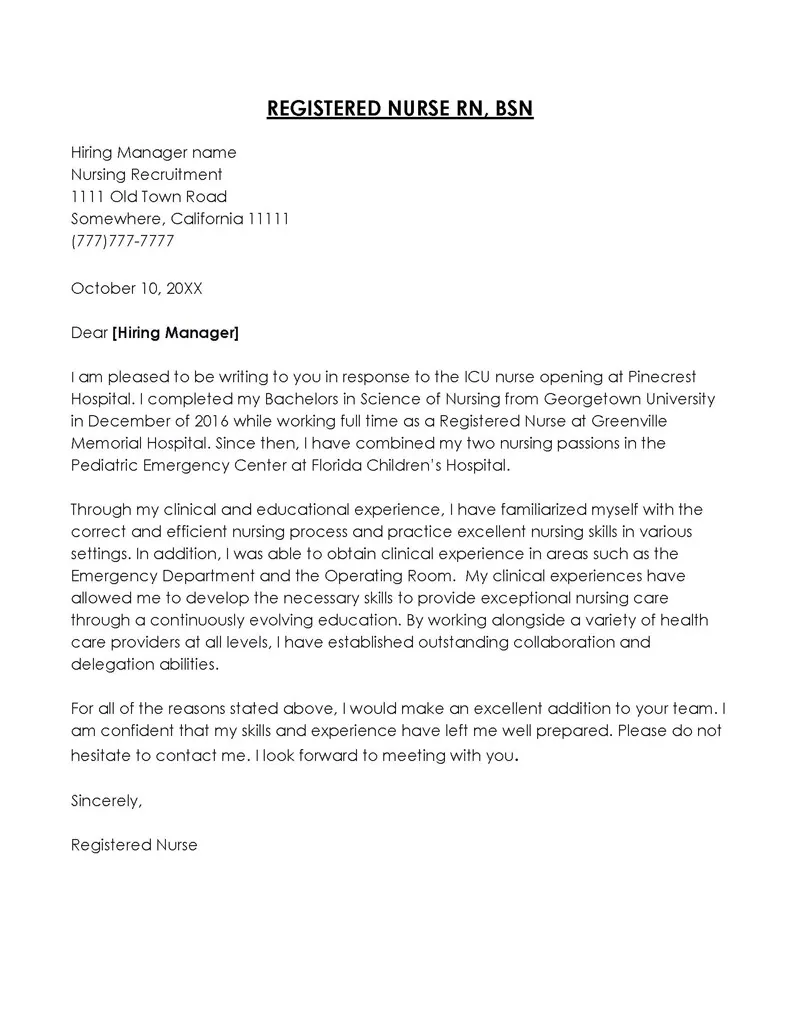
Format your header neatly, using a clear and readable font. Consider using a simple, professional layout. Ensure the information is easy to find and doesn’t blend into the rest of the document. Maintaining a clean header also shows your attention to detail, which is crucial in a healthcare environment. Avoid using a large font size, as it can look unprofessional. Aim for a balance between readability and aesthetics. This will improve the overall appeal of the document
Addressing the Hiring Manager
Always address your cover letter to the hiring manager or the specific person listed in the job posting. If you’re unsure who to address, research the hospital’s website or call the human resources department to find out. Using the hiring manager’s name shows that you’ve taken the time to personalize your application and demonstrates your interest in the position. Generic greetings like ‘To Whom It May Concern’ or ‘Dear Sir/Madam’ are less effective because they lack the personal touch. If you cannot find a specific name, use a professional title, such as ‘Dear Hiring Manager’.
Researching the Hospital
Before writing your cover letter, research the hospital or healthcare facility. Understand their mission, values, and the specific needs of the nursing department. Showing that you understand the organization’s goals and culture demonstrates your genuine interest in the position and increases your chances of being hired. Visit the hospital’s website, read their mission statement, and look for any recent news or initiatives. Tailor your cover letter to reflect this research. Mentioning specific programs, awards, or initiatives that resonate with your values can make your application more compelling.
Highlighting Your Skills and Experience
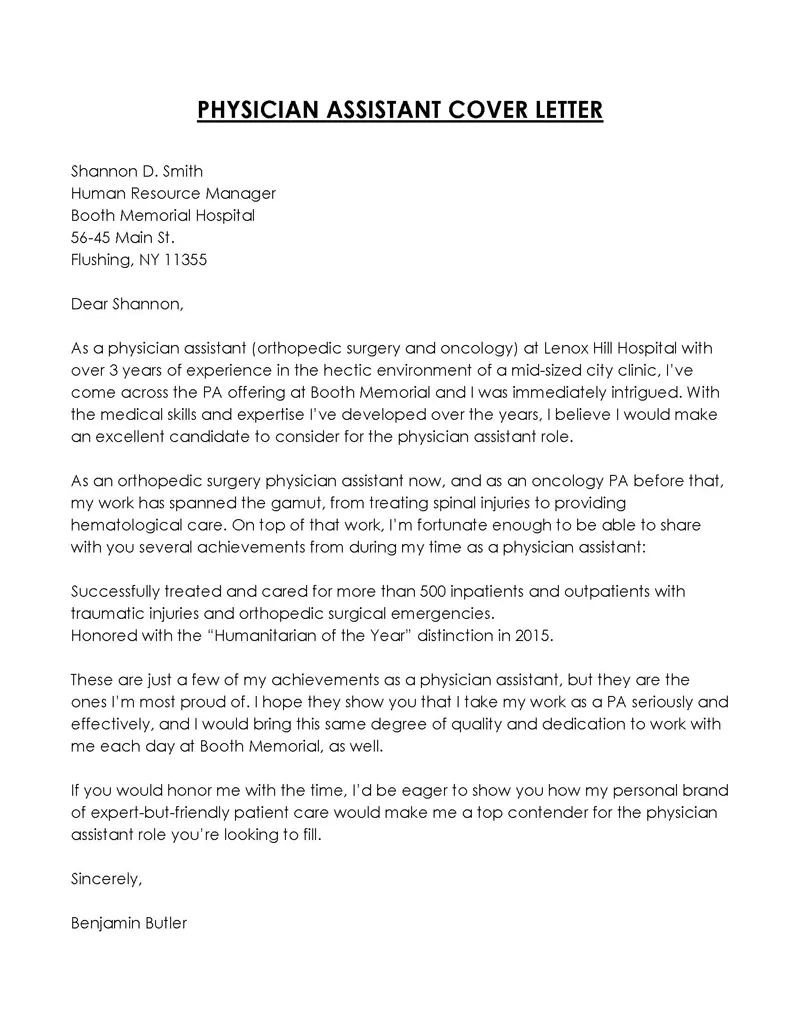
As a new graduate, you may not have extensive professional experience, but you have a wealth of knowledge and skills gained during your nursing education. Highlight any relevant clinical rotations, projects, or volunteer experiences. Emphasize your technical skills, such as medication administration, patient assessment, and electronic health record (EHR) proficiency. It’s essential to connect your skills to the requirements listed in the job description. Quantify your achievements whenever possible. This could include the number of patients you cared for during clinical rotations or the positive feedback you received from instructors or preceptors. This will prove your capabilities.
Showcasing Relevant Clinical Experience
Focus on clinical experiences that align with the job requirements. If the position involves working in a specific specialty, such as critical care or emergency medicine, highlight relevant clinical rotations or experiences. Describe the types of patients you cared for, the procedures you performed, and the skills you utilized. Don’t just list your responsibilities; explain your contributions and the outcomes of your actions. For example, you might describe how you effectively managed a patient’s pain, educated patients on their medications, or collaborated with a healthcare team to improve patient outcomes. This detailed approach will impress the hiring manager.
Emphasizing Soft Skills and Attributes
Soft skills are just as important as technical skills, especially in nursing. Emphasize your communication, teamwork, problem-solving, and critical-thinking abilities. Provide specific examples of how you’ve demonstrated these skills in clinical settings or during group projects. For example, describe a situation where you effectively communicated with a patient to alleviate their anxiety, resolved a conflict with a team member, or used critical thinking to assess a patient’s condition. Showcasing your soft skills demonstrates your ability to handle the challenges of nursing and contribute to a positive work environment. Employers value those that show a positive attitude.
Tailoring Your Cover Letter to the Job Description
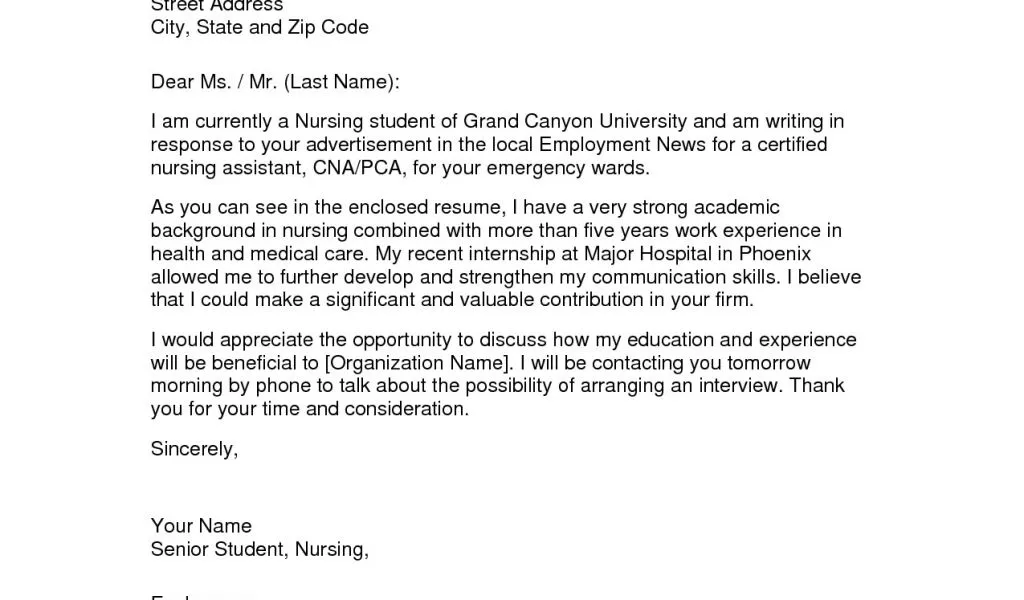
Customize your cover letter for each job application. Carefully review the job description and identify the key skills, experiences, and qualifications the employer is seeking. Then, tailor your cover letter to address these specific requirements. Highlight the relevant experiences and skills that match the job description and use the same keywords and phrases. This demonstrates that you’ve read the job posting and understand the position’s requirements. It shows your attention to detail and proactive approach to applying for a job. Make sure your cover letter directly addresses the needs of the employer.
Keywords and Phrases to Include
Incorporate keywords and phrases from the job description into your cover letter. This helps your application pass through applicant tracking systems (ATS) and ensures that the hiring manager can easily identify your qualifications. Use keywords related to specific skills, such as ‘patient assessment,’ ‘medication administration,’ or ‘wound care.’ Also, include keywords related to soft skills, such as ‘communication,’ ’teamwork,’ and ‘problem-solving.’ However, avoid keyword stuffing. Use the keywords naturally within the context of your sentences. The cover letter should be readable and not appear forced. Make sure the document feels human.
Quantifying Your Achievements
Whenever possible, quantify your achievements. Use numbers and data to demonstrate the impact of your skills and experiences. For example, instead of saying ‘I provided care to patients,’ you could say ‘I cared for an average of 10 patients per shift during my clinical rotations.’ If you received any positive feedback from instructors or preceptors, include it. For instance, you could state that you were ‘praised for excellent patient communication skills by clinical instructors.’ Quantifiable achievements make your cover letter more compelling and help the hiring manager understand the value you bring to the position.
Writing a Compelling Closing Paragraph
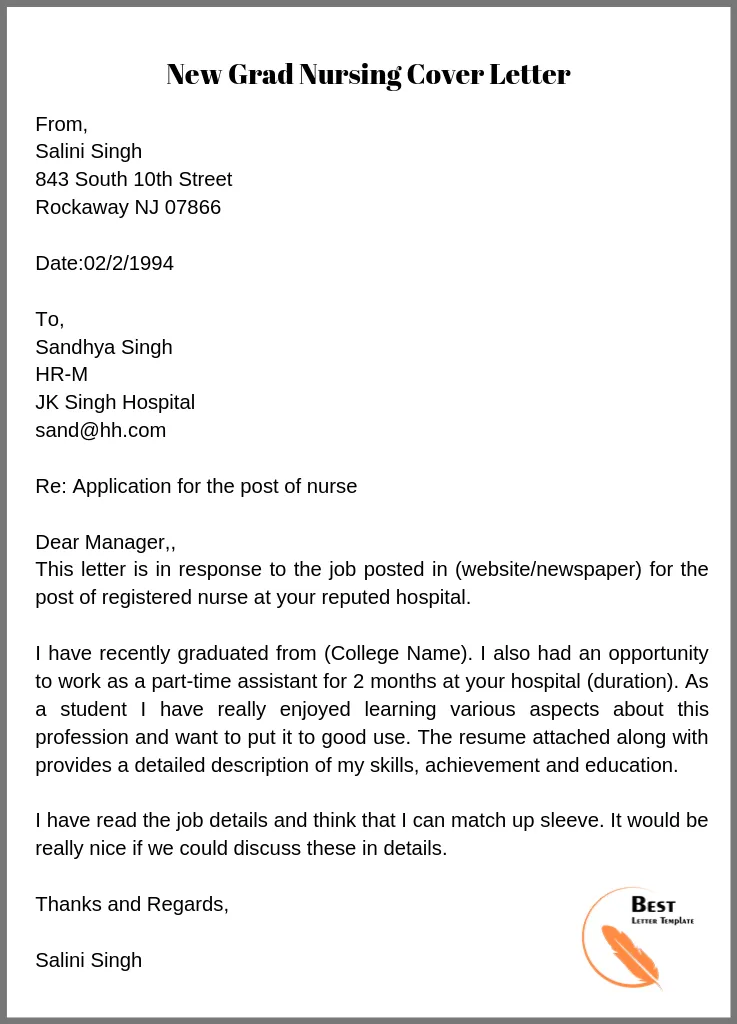
Your closing paragraph should leave a lasting impression on the hiring manager. Reiterate your interest in the position and summarize your key qualifications. Express your enthusiasm for the opportunity and thank the hiring manager for their time and consideration. Also, use a professional closing, such as ‘Sincerely’ or ‘Best regards.’ Avoid using overly casual or informal closings. This final section of your cover letter solidifies your interest.
Expressing Enthusiasm and Availability
Express your genuine enthusiasm for the position and the healthcare facility. Explain why you’re interested in working at that specific hospital or department. Highlight what specifically attracts you to the role and how your skills and experience align with their needs. Also, state your availability for an interview and express your eagerness to discuss your qualifications further. Show that you’re ready and willing to take the next step in the hiring process. This will show your interest in the role
Including a Strong Call to Action
End your cover letter with a strong call to action. Express your interest in an interview and provide your contact information again. Encourage the hiring manager to reach out to you to schedule an interview at their earliest convenience. You can also indicate your willingness to provide references upon request. Making it easy for the hiring manager to contact you increases your chances of being considered for the position. Concluding your cover letter with a clear call to action helps move your application forward.
Proofreading and Formatting Your Cover Letter
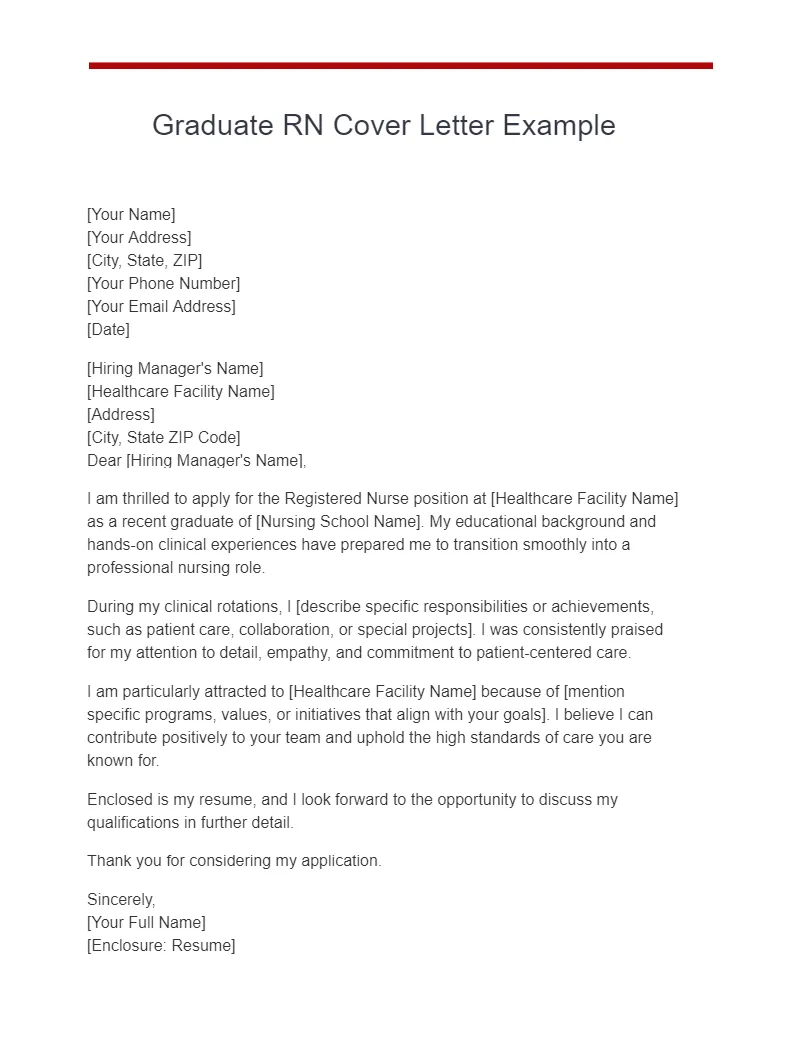
Proofreading and formatting are critical steps in the cover letter writing process. Your cover letter must be free of grammatical errors, spelling mistakes, and formatting inconsistencies. This demonstrates professionalism and attention to detail, which are essential qualities for a nurse. Take the time to carefully review your cover letter and ensure that it’s polished and error-free. Using a spell checker and grammar checker can help, but it’s also important to read your cover letter multiple times and ask someone else to review it for you. This can give you a fresh perspective.
Checking for Grammar and Spelling Errors
Grammatical and spelling errors can significantly detract from your cover letter and give the impression that you lack attention to detail. Carefully review your cover letter for any errors in grammar, punctuation, and spelling. Use a grammar and spell-checking tool, but don’t rely on it entirely. Read your cover letter aloud to catch any awkward phrasing or sentences that don’t make sense. Ask a friend, family member, or career counselor to review your cover letter and provide feedback. A fresh pair of eyes can help you spot errors that you may have missed.
Ensuring a Professional Tone and Format
Maintain a professional tone throughout your cover letter. Avoid using slang, jargon, or overly casual language. Write in a clear, concise, and respectful manner. Use a professional font, such as Times New Roman or Arial, and maintain consistent formatting throughout the document. Use headings, subheadings, and bullet points to break up large blocks of text and make your cover letter easy to read. The format should be neat, clean, and easy to navigate. Ensure that the document is well-organized. This will increase readability and appeal.
Common Mistakes to Avoid
Generic Cover Letters
Avoid sending generic cover letters that could be used for any job application. Generic cover letters often lack the specific details and personalization that employers look for. They fail to highlight your qualifications for a specific role or demonstrate your interest in a particular organization. Instead, tailor each cover letter to the specific job you’re applying for. Research the employer, read the job description carefully, and highlight the skills and experiences that align with the position’s requirements. A tailored cover letter shows that you’ve taken the time to understand the job and are genuinely interested in the opportunity.
Focusing on Yourself Too Much
While it’s important to highlight your skills and experiences, avoid focusing too much on yourself and neglecting the employer’s needs. Your cover letter should emphasize how your skills and experiences can benefit the employer. Focus on what you can bring to the role and the value you can add to the organization. Connect your qualifications to the specific requirements of the job description and explain how you can contribute to the hospital’s goals. Demonstrate that you understand the employer’s needs and how you can help them achieve their objectives. This will show your interest in the company.
Failing to Proofread
Failing to proofread your cover letter can be a significant mistake. Grammatical errors, spelling mistakes, and formatting inconsistencies can damage your credibility and give the impression that you lack attention to detail. Always proofread your cover letter multiple times. Use a grammar checker and a spell checker, but don’t rely on them entirely. Read your cover letter aloud to catch any awkward phrasing or sentences that don’t make sense. Ask a friend, family member, or career counselor to review your cover letter and provide feedback. Proofreading is a crucial step in the cover letter writing process, and it can make the difference between getting an interview and being overlooked.
Final Thoughts
Writing a compelling RN cover letter is a crucial step in the job application process. By following the tips and strategies outlined in this guide, you can create a cover letter that highlights your skills, experience, and enthusiasm for nursing. Remember to tailor your cover letter to each job application, proofread carefully, and express your genuine interest in the position. With a well-crafted cover letter, you’ll be one step closer to landing your dream job. Your cover letter should serve as a powerful introduction to your skills. Good luck in your job search!
Next Steps and Resources
After completing your cover letter, the next steps involve submitting your application and preparing for the interview. Ensure that your resume is up-to-date and highlights your qualifications. Research common interview questions for RN positions and prepare your answers. Practice your interviewing skills with a friend or career counselor. Networking with other nurses and attending career fairs can also help you find job opportunities. Consider seeking feedback on your cover letter and resume from a career counselor or a trusted professional. This will improve your chances of securing the job.
